|
Relevant
books
available at Amazon
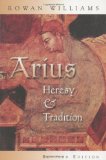 
Rowan Williams -----
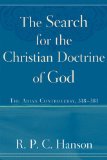 
R.P.C. Hanson -----
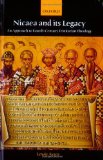 
Lewis Ayres ----- Relevant
books
available at Amazon
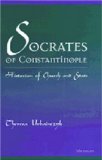 
Socrates of Constantinople: Historian of Church and State Theresa
Urbainczyk ----- 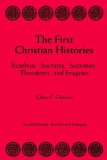 
Glenn Chesnut |
The Epistle of Alexander Bishop of Alexandria.
To our beloved and most honored fellow-Ministers of the Catholic Church
everywhere, Alexander sends greeting in the Lord.
Inasmuch as the Catholic Church is one body, and we are commanded in the holy
Scriptures to maintain ‘the bond of unity and peace,’ it becomes us to write,
and mutually acquaint one another with the condition of things among each of us,
in order that ‘if one member suffers or rejoices, we may either sympathize with
each other, or rejoice together.’ Know therefore that there have recently arisen
in our diocese lawless and anti-christian men, teaching apostasy such as one may
justly consider and denominate the forerunner of Antichrist. I wished indeed to
consign this disorder to silence, that if possible the evil might be confined to
the apostates alone, and not go forth into other districts and contaminate the
ears of some of the simple. But since Eusebius, now in Nicomedia, thinks that
the affairs of the Church are under his control because, forsooth, he deserted
his charge at Berytus and assumed authority over the Church at Nicomedia with
impunity, and has put himself at the head of these apostates, daring even to
send commendatory letters in all directions concerning them, if by any means he
might inveigle some of the ignorant into this most impious and anti-christian
heresy, I felt imperatively called on to be silent no longer, knowing what is
written in the law, but to inform you of all of these things, that ye might
understand both who the apostates are, and also the contemptible character of
their heresy, and pay no attention to anything that Eusebius should write to
you. For now wishing to renew his former malevolence, which seemed to have been
buried in oblivion by time, he affects to write in their behalf; while the fact
itself plainly shows that he does this for the promotion of his own purposes.
These then are those who have become apostates: Arius, Achillas, Aithales, and
Carpones, another Arius, Sarmates, Euzoïus, Lucius, Julian, Menas, Helladis, and
Gaius; with these also must be reckoned Secundus and Theonas, who once were
called bishops. The dogmas they have invented and assert, contrary to the
Scriptures, are these: That God was not always the Father, but that there was a
period when he was not the Father; that the Word of God was not from eternity,
but was made out of nothing; for that the ever-existing God (‘the I AM’—the
eternal One) made him who did not previously exist, out of nothing; wherefore
there was a time when he did not exist, inasmuch as the Son is a creature and a
work. That he is neither like the Father as it regards his essence, nor is by
nature either the Father’s true Word, or true Wisdom, but indeed one of his
works and creatures, being erroneously called Word and Wisdom, since he was
himself made of God’s own Word and the Wisdom which is in God, whereby God both
made all things and him also. Wherefore he is as to his nature mutable and
susceptible of change, as all other rational creatures are: hence the Word is
alien to and other than the essence of God; and the Father is inexplicable by
the Son, and invisible to him, for neither does the Word perfectly and
accurately know the Father, neither can he distinctly see him. The Son knows not
the nature of his own essence: for he was made on our account, in order that God
might create us by him, as by an instrument; nor would he ever have existed,
unless God had wished to create us. Some one accordingly asked them whether the
Word of God could be changed, as the devil has been? and they feared not to say,
‘Yes, he could; for being begotten, he is susceptible of change.’ We then, with
the bishops of Egypt and Libya, being assembled together to the number of nearly
a hundred, have anathematized Arius for his shameless avowal of these heresies,
together with all such as have countenanced them. Yet the partisans of Eusebius
have received them; endeavoring to blend falsehood with truth, and that which is
impious with what is sacred. But they shall not prevail, for the truth must
triumph; and ‘light has no fellowship with darkness, nor has Christ any concord
with Belial.’ Who ever heard such blasphemies? or what man of any piety is there
now hearing them that is not horror-struck, and stops his ears, lest the filth
of these expressions should pollute his sense of hearing? Who that hears John
saying, ‘In the beginning was the Word,’ does not condemn those that say, ‘There
was a period when the Word was not’? or who, hearing in the Gospel of ‘the
only-begotten Son,’ and that ‘all things were made by him,’ will not abhor those
that pronounce the Son to be one of the things made? How can he be one of the
things which were made by himself? Or how can he be the only-begotten, if he is
reckoned among created things? And how could he have had his existence from
nonentities, since the Father has said, ‘My heart has indited a good matter’;
and ‘I begat thee out of my bosom before the dawn’? Or how is he unlike the
Father’s essence, who is ‘his perfect image,’ and ‘the brightness of his glory’
and says: ‘He that hath seen me, hath seen the Father’? Again how if the Son is
the Word and Wisdom of God, was there a period when he did not exist? for that
is equivalent to their saying that God was once destitute both of Word and
Wisdom. How can he be mutable and susceptible of change, who says of himself, ‘I
am in the Father, and the Father in me’; and ‘I and the Father are one’; and
again by the Prophet, ‘Behold me because I am, and have not changed’? But if any
one may also apply the expression to the Father himself, yet would it now be
even more fitly said of the Word; because he was not changed by having become
man, but as the Apostle says, ‘Jesus Christ, the same yesterday, to-day, and
forever.’ But what could persuade them to say that he was made on our account,
when Paul has expressly declared that ‘all things are for him, and by him’? One
need not wonder indeed at their blasphemous assertion that the Son does not
perfectly know the Father; for having once determined to fight against Christ,
they reject even the words of the Lord himself, when he says, ‘As the Father
knows me, even so know I the Father.’ If therefore the Father but partially
knows the Son, it is manifest that the Son also knows the Father but in part.
But if it would be improper to affirm this, and it be admitted that the Father
perfectly knows the Son, it is evident that as the Father knows his own Word, so
also does the Word know his own Father, whose Word he is. And we, by stating
these things, and unfolding the divine Scriptures, have often confuted them: but
again as chameleons they were changed, striving to apply to themselves that
which is written, ‘When the ungodly has reached the depths of iniquity, he
becomes contemptuous.’ Many heresies have arisen before these, which exceeding
all bounds in daring, have lapsed into complete infatuation: but these persons,
by attempting in all their discourses to subvert the Divinity of THE WORD, as
having made a nearer approach to Antichrist, have comparatively lessened the
odium of former ones. Wherefore they have been publicly repudiated by the
Church, and anathematized. We are indeed grieved on account of the perdition of
these persons, and especially so because, after having been previously
instructed in the doctrines of the Church, they have now apostatized from them.
Nevertheless we are not greatly surprised at this, for Hymenæus and Philetus
fell in like manner; and before them Judas, who had been a follower of the
Saviour, but afterwards deserted him and became his betrayer. Nor were we
without forewarning respecting these very persons: for the Lord himself said:
‘Take heed that no man deceive you: for many shall come in my name, saying, I am
Christ: and shall many deceive many’; and ‘the time is at hand; Go ye not
therefore after them.’ And Paul, having learned these things from the Saviour,
wrote, ‘That in the latter times some should apostatize from the faith, giving
heed to deceiving spirits, and doctrines of devils,’ who pervert the truth.
Seeing then that our Lord and Saviour Jesus Christ has himself enjoined this,
and has also by the apostle given us intimation respecting such men, we having
ourselves heard their impiety have in consequence anathematized them, as we
before said, and declared them to be alienated from the Catholic Church and
faith. Moreover we have intimated this to your piety, beloved and most honored
fellow-ministers, in order that ye might neither receive any of them, if they
should presume to come to you, nor be induced to put confidence in Eusebius, or
any other who may write to you about them. For it is incumbent on us who are
Christians, to turn away from all those who speak or entertain a thought against
Christ, as from those who are resisting God, and are destroyers of the souls of
men: neither does it become us even ‘to salute such men,’ as the blessed John
has prohibited, ‘lest we should at any time be made partakers of their sins.’
Greet the brethren which are with you; those who are with me salute you.
|

